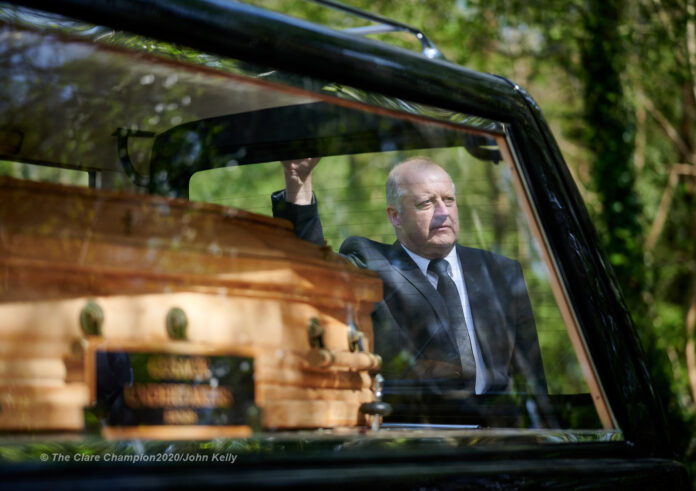“AS a mainly rural people, we’ve always had a tradition of going to funerals to provide support and show sympathy, Covid-19 has forced us to make massive changes to that custom,” said Ennis-based undertaker, Cyril Cusack, commenting on one of the most challenging aspects of all of the current public health guidelines limiting gatherings and movement in the face of the Coronavirus.
Reposals, hand-shakes and books of condolence have all been ruled out for the time being and the traditional funeral drawing huge number of mourners is a sight we are unlikely to see for some time. Detailed guidelines from the Health Service Executive (HSE) to funeral directors outline how social distancing must be implemented, meaning only private ceremonies for immediate family and friends are allowed. Despite the restrictions, Mr Cusack said families are handling the situation with dignity and grace at an extremely challenging time.
“First of all, families have to deal with their shock and sometimes anger when somebody passes away,” he noted. “Then, they have to cope with restrictions on how their loved one’s funeral is handled. As a funeral director, our role is to sympathise and support families, as well as to communicate what the public health guidelines mean in practical terms. Occasionally, some family members may find the situation hard to accept, but when they realise why the HSE guidelines are there, they understand many traditions are not longer possible.”
Restrictions to prevent the transmission of the Coronavirus impact almost every aspect of funerals currently, Fr Brendan Quinlivan, Parish Priest of Tulla and Diocesan Director of Communications noted: “For bereaved people, this is a really, really difficult and challenging time. Our tradition of having the whole community come together has been taken away and we feel its loss greatly. For us as clergy, we are being encouraged by the guidelines to provide support remotely as much as possible, but nothing can replace face-to-face communication and being there with people in their grief.”
With funeral services now proceeding straight to the church, and limited to around ten mourners, communities are finding other ways to express their sympathies and their support, Fr Brendan said. “Seeing just ten people spread out around the church can be very heart-breaking. I have seen situations where neighbours will line the roads, using social distancing, as the funeral passes and that can be very supportive. It was wonderful to see the people who lined the roads from Kilrush to Doonbeg for the funeral of the late Fr Joe Haugh. It is encouraging to know that communities are not letting go of that spirit of connection.”
Live streaming of funeral services is another facility that has become more popular in Mr Cusack’s experience. “Up to now, there wouldn’t have been a huge demand,” he said. “But now, people are keen to share in the ceremony online, when they can’t attend. Getting the ceremony streamed is becoming far more popular and it means the family can share a code with friends who can log on and see the proceedings live.”
Restrictions on gatherings have meant a change in practices at the country’s smaller crematoria, including those in Shannon and Cork with mourners now saying farewell to their loved ones at the door and not entering the building. Mr Cusack said that the option of having under takers retain and look after ashes is becoming popular: “In some cases, people are asking for us to keep the ashes for a time, with plans in mind for future memorial services after the restrictions end.”
The prospect of celebrating memorial ceremonies in the future, Fr Brendan agreed, is a source of hope for many. “People are holding on to that as a consolation,” he said. “Having people come together to share memories is a really important part of the process. It gives the life of the deceased person real meaning and often families find out more about their loved one.”
Condolences, usually expressed through a handshake or a hug, are now being offered through a range of electronic media and Fr Brendan added that communities now have the time to write down memories to share with bereaved people: We are all spending more time at home and there is a chance for us to write and to show people that they are not alone and that the lives of their loved ones had meaning. Grieving is a long process and having cards and messages to read back over at a future date is an important thing for someone who is bereaved. We shouldn’t ever underestimate the power of the written word.”
How long the current restrictions will remain in place for funeral gatherings is something nobody can predict. Said Mr Cusack: “We really don’t know when these restrictions will be relaxed. Some of the new measures, like social distancing, will be with us for some time. Across so many sectors, long-standing traditions have changed in a matter of days and weeks. We could never have predicted this.”



